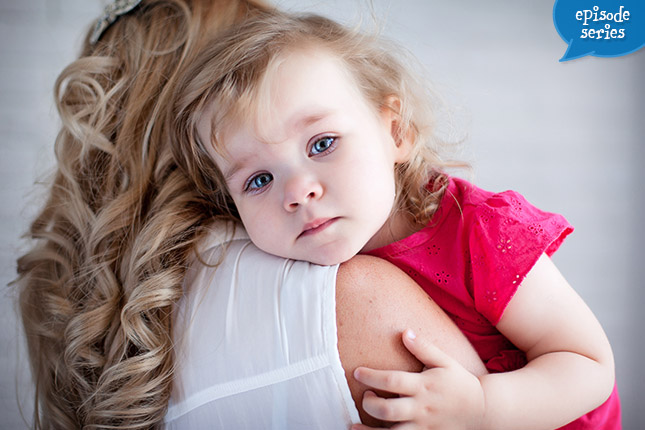NEWBIES
Delayed Postpartum Depression: Having More Babies
[00:00:00]
Please be advised, this transcription was performed from a company independent of New Mommy Media, LLC. As such, translation was required which may alter the accuracy of the transcription.
[Theme Music]
KRISTEN STRATTON: It can seem daunting to consider the idea of having another child after experiencing postpartum depression or another perinatal mental health disorder including anxiety, OCD or psychosis. What of it happens again? What if it is worse? Who would sign themselves up for this experience again? Yet there are so many reasons families may want another child. How can you reconcile the fear with the longing for more babies? This is Newbies!
[Theme Music and Introduction]
KRISTEN STRATTON: Welcome to Newbies. Newbies are you’re online on the go support group guiding new mothers through the babies the first year.
I am your host Kristen Stratton, Certified Birth Doula, Postpartum Doula, and Owner of the In-due Season Doula Services.
If you haven’t already, be sure to visit our website at www.newmommymedia.com and subscribe to our weekly newsletter. You can also subscribe to our show through iTunes so you automatically get new episodes from their release. Here is Sunny with details on how you can get involved with newbies.
SUNNY GAULT: All right, hey everybody. We are so thankful that you are joining as here at newbies. We want you to be part of our show that's what makes this fun as we get to meet so many different moms and dads and they join us on the show. If that interests you at all head over to our website at www.newmommymedia.com you can click on the banner that says joins us as a parent and then from there, there is a quick online form which you can just fill and it gives as more information about you so that we can reach out to you if we are working on a topic that we think you’ll be a good fit for.
The other thing is you can join our Facebook group where we post all our topics and times. If you are on social media we have started a hash tag that I think is really important. I’m on social media a lot mainly for all the shows, posting different episodes and promoting things and I have seen a lot of things online parents mainly moms kind of being down on other moms and stuff like that.
We’ve started the harsh tag-support all moms and it's something that I’m really passionate about that I really feel like if you have done your research, and we all make decisions for our family’s on a day to day basis, right, and we do it because we love our families and we are doing what we think is in the best interest of our families. Overall as moms we should be supporting each other’s in those decisions a little bit more.
If you are on social media and you want to help with this and encourage this positive movement to encourage other moms, please start using the hash tag on support all moms.
KRISTEN STRATTON: All right let's meet the mom joining us today. Tell us about yourself, your family and your experiences on today's topic.
RACHEL KELLER: Hi, my name is Rachel Keller and my husband’s name is Trevor. We’ve been married for ten years this August. We have three children Nathan who is five, Sammy is three and Charlie is four months. After Nathan’s birth, I suffered from postpartum depression and mild anxiety. After Sammy's birth, I had a pretty severe postpartum anxiety and mild postpartum depression and Charlie’s I have actually being good. I haven't thankfully had any problems so far.
KRISTEN STRATTON: Thank you so much for being on our show today.
[Theme music]
SUNNY GAULT: Before we kick off our episode today, I want to talk about an app. It is called “MyMoodTracker” and I should say there are actually two different versions of this app. There is MyMoodTracker and MyMoodTrackerlight. We are mainly going to focus on the light tracker today mainly because the full blown app is like ten dollars so I was like let’s start with the light, if you like the light and you want to do more with the app then you can upgrade and pay ten dollars.
For the light version, it is absolutely free.
Basically, it’s a way to track your day to day mood which may seem really simple but what I really like about this app it's that the user interface is really fantastic. You open it up and it gives you today's day and the time and it literally says I’m feeling and then it has a question mark and then you tap the little button and then a bunch of little emoticons, is that what they are called? Those things with little smiling faces you guys know what they are called?
It's a wide variety of these things with little smiling faces, sad faces, scared faces, crazy faces, mad faces, whatever, start popping out and you select whatever you want and it kinds of gives you a description of what that emoticon means, you hit done. You can also rate your mood from the scale of one to ten. In addition to the little smiling face, it's got this little thing that you can just drag from one to ten, you can add notes to it and that's the basic part of the app.
It does keep a history of all of this so if you want to know on a day to day basis, you might even be able to do this multiple times in a day. You know just how you are feeling throughout the course of the day, the week, a month or whatever you want. It does keep a history for you so can kind of check that out. You do have the ability to export it. I believe that upgrade comes with like how far back in your history you want to go.
I’m not sure what exactly what is included in the free version but if you want to go like really far back into your history I’m pretty sure you are going to have to upgrade, so that’s where the ten dollars would come into play. I wanted to get your feedback, everybody’s feedback since we all kind of . . . even if you haven’t experienced any kind of you know diagnosed depression. I think we can all go through it in our day to day life as parents and think about the roller coaster ride we go about with our emotions in handling our children. Kristine, what do you think about My Mood Tracker-Lite?
KRISTEN STRATTON: I have actually used it before I don’t remember how long it’s been since I used it. I want to say it’s been like probably last year because I was noticing that at some point in my cycle I was very impatient at home with the children. So I wanted to kind of know how many days before my cycle starts am I becoming this crazy person. Usually, for me it actually gets interesting it gets a little bit crazy, you are known starting to me personally, I get a little short tempered and impatient right before I ovulate.
Again probably four days before my cycle starts. So I thought that was interesting and I am like it’s like my body is trying to fend off all the other competitions, like my children are competition with this egg, right. But I think it’s good. It gives good self-awareness even if maybe you are not struggling with a mood disorder trying to figure out something that’s cyclical; it still gives you good a feedback and you are like why am I feeling this way? What’s going on? What stresses am I experiencing and that maybe is affecting my mood in this way. So I think it is good, I like it.
SUNNY GAULT: One thing I wanted to add is that it is just called logs which are kind of a strange term if you ask me, but if you click on logs there are other things you can track too which will give you a better idea of what’s actually happening in your life just like Kristine was talking about. There is actually a section for menstrual cycle so you can enter that information, your sleep cycle, you can enter medication, what kind of exercise you had that day, your stress level, energy level, pain level if that is an issue for you now after giving birth, so it can track a bunch of different things.
But again the goal is to figure out what your overall mode is and then hopefully be able to figure out from their you know what is causing you to feel that way. Andrea, I would like to know from an expert point of view, someone who works with disorders, what do you think of something like this? An app like this.
ANDREA KNOX: I think that it’s is a good idea. I think that it can be kind of hard especially when you are in the thick of it after the birth of a child and maybe you may be experiencing a disorder and trying to put everything together, and see what’s going on with yourself. I think that it’s kind of an objective way to say well this is the information, this is the data, and this is actually how I have been feeling over the past few days and what’s going on with me so I think it is a great idea.
SUNNY GAULT: Rachel is this something that you think that you could use or would have used in the past had you known about it?
RACHEL KELLER: Yes absolutely I have never used that before but it sounds like it would be very beneficial.
SUNNY GAULT: All right, we are going to include a link of this on our website along with a little description and download links if you want to check them out. I know it’s available on iTunes I’m not sure on other devices but we will let you know on the site, so check it out.
[Theme music]
KRISTEN STRATTON: Today we are continuing our series on delayed postpartum depression by discussing having more babies. Our expert today is licensed marriage and family therapist Andrea Knox, thank you for joining us today Andrea, welcome to the show.
ANDREA KNOX: Thank you so much for having me.
SUNNY GAULT: Andrea can you please explain what impact postpartum depression and other disorders can have on us which may physically impact our desire to have another child?
ANDREA KNOX: Sure I think having a disorder postpartum can be a very dark scary overwhelming experience and at that time it can affect our ability to function, make rational decisions, our sense of self as a parent, our relationship with our partners and so many other parts of our lives. In addition to that, often it is a surprise. Nobody puts postpartum mental health disorders on our baby’s registry right.
KRISTINE STRATTON: No, I did not.
ANDREA KNOX: It’s an uninvited guest to the party so I think we can have because it is so . . . it can be such an awful time and it is often unexpected. We can have this response to it like trauma and our minds and bodies have this natural defense against trauma, ‘hey remember that was scary don’t do that again’, so it brings up a lot of questions when we consider another pregnancy.
SUNNY GAULT: So what emotional barriers must a mother overcome to even begin to consider another child?
ANDREA KNOX: Well because of we are talking about this sort of reacting to it almost like a trauma. I think it’s really easy to avoid thinking about your past experience of a disorder, this is very raw stuff. Your experience holds this key information about your decision to having another child and what your needs would be if you do decide to have another baby. The ability to look at your previous or current experience of a disorder can be something to overcome. Also, it is normal for the process of considering pregnancy, trying to conceive or having another baby after a postpartum disorder to involve some level of anxiety. It’s not an easy choice, having some anxiety doesn’t mean it is a wrong choice. There need to be some acceptance around the difficulty of the choice and that it may be difficult after birth.
KRISTEN STRATTON: How many women do you think are carrying postpartum disorder from one postpartum period into the next pregnancy and then into another postpartum time?
ANDREA KNOX: Well if the disorder was not treated the first time it’s highly likely that it will continue into the next pregnancy and then puts you at risk for carrying it postpartum. If it’s untreated it is highly likely. If it has been treated; the data that I have found is that at least thirty-two percent of women who previously had postpartum depression will have symptoms again in the subsequent pregnancy.
KRISTEN STRATTON: Rachel I know you shared that your experience after your first two pregnancies, what was your experience after your first pregnancy and having postpartum depression anxiety and then how did that affect your decision to having another baby and then subsequently experience it again.
RACHEL KELLER: Well with my first postpartum I had gone through a lot of complications during the delivery. So I was feeling depression and anxiety and so much fear but I didn’t recognize if that was postpartum depression. I had heard about postpartum depression before but the classic signs you hear about are you want to hurt your baby but for me, it was exactly the opposite of that.
I could not leave him I was really over protective and very fearful about everything and I associated that with the trauma that I had gone through during his birth.
So I didn’t realize what was going on. We ended up getting pregnant pretty quick not as quick as others but within a year I was pregnant again. For us, we were weighing the emotional state that I was in because I purely just chopped that up. It was the trauma that was not going to happen the second time, it was just a fluke thing that happened the second time I will be good so I just kept on telling myself that if I have another pregnancy that is healthy and if nothing is bad I will be okay the next time. So then I did have a wonderful pregnancy the second time, no complications, beautiful birth no trauma and the second postpartum time it was much worse, much more intense.
I did not understand was going on and I didn’t really reach out because I was embarrassed and I did not know how to fix it and I did know going on walks helps, keeping busy helped, play dates just kept distracting myself so I did a lot of that and slowly with time it gets a lot easier and you learn how to leave with it.
I started training to be a doula when my second son was about eighteen months old and there was a ton of required reading and one of the books I was to read was on postpartum mood disorders and I realized reading that book that everything I was experiencing was in the book and it gave me I guess a lot of validation that I was not crazy and that it was normal and that it just happens sometimes.
With that, I was able to address it a lot more thoroughly and appropriately before we gave birth to my third daughter. I think with that journey I just found the tools that just helped me and then we were really proactive I guess you could say after having our third daughter just to make sure I got the support that I needed early on and so I didn’t get bad off as I did with the second.
KRISTINE STRATTON: Right it is like this light bulbs always go off after every baby and you look back and go like oh gosh I wish I had known that it would have been much easier. I know that I kind of had the same thing we had our daughter and then my husband was deployed the first year of life. So I did not have that social support which I know is a huge contributing factor and then as soon as he got back home we were pregnant again within like two or three months and my postpartum anxiety and depression was so much more severe after I had my first son.
Then we got pregnant again, I am very fertile with our third when he was about two months. I had three kids just under three and a half years and me never really recovered from the previous anxiety and depressive disorder and so by the time I having my postpartum time after my third and I had a most horrific birth, I was just virtually unrecognizable to myself. I look back know because know I am almost three years my postpartum from that birth and I am like I don’t know who that person was because I had no vibrancy and no life.
I was just kind of a shell going through emotions but if people knew what was going on inside my head you know like you said you are embarrassed. It is embarrassing for people to know that you are not yourself and to have to ask for help. It is kind of hard especially when you are trying to take care of three people, you do not want people to think that you are not capable of being a mom or you are a bad mom, so thank you for sharing that.
ANDREA KNOX: I think it is very interesting what Rachel was saying about in her last pregnancy she really had an awareness and was able to prepare and it sounds like postpartum was a different experience. There is no way to know because postpartum disorders are such a mix of psychological, social and genetic factors. But I wonder if that didn’t have something to do with how things turned out. So I just feel like that awareness and having time prepare and to think about it I think it is so important.
RACHEL KELLER: You don’t always realize how bad you feel until you get healthy mentally. I know for me when I am pregnant I feel really good, it’s the postpartum I feel really horrible. So for me with both of my first and second pregnancy once I was pregnant and I was feeling level again I would look back and think oh my goodness I did not realize how severely depressed and how much anxiety I was having until I was feeling better.
Sometimes it is hard. Sometimes you need a partner, someone who is aware of what you are going through or what could happen to you so that they can kind of watch you because sometimes you do not always see what is going on as well as someone else might like your husband or significant other.
KRISTINE STRATTON: Andrea what are the potential risks for carrying depression or other mood disorder into the next pregnancy or postpartum?
ANDREA KNOX: Well like we have been talking about, if it wasn’t treated the first time round that’s a big risk factor and also medical problems that can affect mental health like thyroid or diabetes, having fertility treatment because of the manipulation of hormones is a risk factor, anxiety or negative feelings about pregnancy, triggers from previous pregnancy or delivery or previous losses. So kind of like Rachel mentioned with her complications and problem with the baby’s health postpartum after delivery. So for example if the baby is in the NICU or other stressors for example sleep problems or feeding problems.
Two big ones are a lack of support, it’s so huge and also other life stresses. So if there are loss, relationship issues, moving, financial issues, all of these things are sort of you know there is a foundation for mental health and if there are other stresses that are coming into play it just sort of brings down the threshold for being healthy.
KRISTEN STRATTON: When we come back we will continue our discussion on delayed postpartum depression and having more babies. We will be right back.
[Theme music]
KRISTEN STRATTON: Welcome back to the show. We are continuing our discussion with Andrea Knox. Andrea, how often do women not want to get pregnant again and stop growing their family because of concerns about their mental health?
ANDREA KNOX: So I have looked at information about this and I did not come up with statistics and I am kind okay with that because I feel like it is a very personal choice. But I would say that this is a very common feeling. When I talk to moms who have been through disorder the first time or a previous time and they are talking about a next child, immediately the first thing they are thinking is I don’t want to do that again. How are we going to prevent this, oh my gosh this is so overwhelming.
What I can say is just that sense in that feeling of I don’t want to do this again and maybe we should stop is very common. I don’t know if that answers your question but I really couldn’t find information and I kind of don’t want people to have a sense of like this number of people are supposed to do this or something. So I hope that is okay.
KRISTINE STRATTON: Yes I like that because as you said it could be one of many factors, you know there is so much that goes into that decision in general and I think it’s not something that people definitely don’t ask themselves. I know I asked myself that question now, you are right I think that would be a personal kind of choice and hard to quantify that. What are the stresses that a spouse or partner experiences while supporting the mother during her depression which may make them hard to make the family?
ANDREA KNOX: Oh it could be so hard for a partner see a woman experience this and of course men can also have postpartum disorders too so this can go both ways. But to speak in terms of the mother I think partners often feel helpless, overwhelmed maybe confused about why this is happening when it is supposed to be the happiest time of our life. It can just be really challenging to witness your partner in pain and you get scared and you have to pick up all the extra duties if mom isn’t just able to be there and is kind of in the grips of depression or anxiety or the disorder. In addition to that, it is very normal for couples to experience relationship dissatisfaction after a baby is born. This happens to over two-thirds of couples, so it is a time not only of adjustments of being in this experience of a disorder but their relationship is also on the back burner and I think it can be really overwhelming and isolating to think about do that again.
KRISTINE STRATTON: Rachel I’m really curious but if you do not want to share this that is fine, I’m just curious if you and Trevor ever talked about how it was for him to see you experience that.
RACHEL KELLER: You know we have talked about it and it was hard. I am one of those people that sometimes it’s hard to tell what I am feeling inside, so he wouldn’t always realize how bad often I was but when I opened up to him after our second child more about what I was feeling and going through, I started to talk more after I was getting better about what I had been going through. It was hard on him to listen because he didn’t realize what extreme I had gone to you know mentally for me.
KRISTINE STRATTON: Thank you for sharing that and so what are the ways Andrea that a couple can prepare for mental health challenges that may intensify or emerge in a subsequent pregnancy?
ANDREA KNOX: I think Rachel was hinting on this, communication is so important. What does a mom need her partner to say? What are the warning signs? What do we need to do differently? So just creating a dialogue about what the needs are? What the experience is? What does the partner need to be looking for? And really assess what was the hardest and what helped last time and make a plan. I am a huge advocate for making a postpartum plan. How can mom get more sleep? Eat nutritious food, get time away and exercises, have time with her partner, make the transition smooth for the older child or children.
So I just feel like this is a team effort to get resources lined up in advance and not having to try to do this when mom is overwhelmed or both partners are overwhelmed and mom could be under the influence of a disorder and not thinking clearly but just really sort of coming together and saying how are we going to handle this and how can we make this a good experience, the best experience that we can.
KRISTINE STRATTON: So Andrea how can women who have a history of postpartum depression and other mood disorders work with their family, their therapist, their medical providers to prepare for their future pregnancy?
ANDREA KNOX: There is a lot that can be done. I think this is the hopeful part, a therapist can help you organize your thoughts about the idea of having another child, I think it is important to be clear on your thoughts and feelings around that.
KRISTINE STRATTON: I love how you said “organize”, I love that.
ANDREA KNOX: I feel like that is kind of the job for a therapist, not necessarily to help you decide or tell you what to do but really just to sort of lay it all out and see what direction do you want to take and what feels like it is most often good for you. Especially a therapist who understands prenatal issues and then you can also look at the risk factors and see how they can be addressed.
If lack of support was an issue the first time around, how can we adjust that this time so that we can lessen up that risk factors and a therapist can also help with creating a postpartum plan as well as being available for support and watching out the symptoms during pregnancy and postpartum?
So you can feel like you have an additional layer of support and have another person involved who is going to be there with you. I heard Rachel saying that it was hard to recognize and you kind of need somebody there sometimes to tell you this is what I am seeing in you and it is great to have your spouse or partner be able to be there with you.
Sometimes you need other people to be there with you too like your friends or family or a therapist. A doctor or psychiatrist can consider options for medication with you in case you need it. I think that if symptoms were severe it might be a good idea just to think about that. I know that there could be a lot of reservations with being pregnant and breastfeeding but I think it is just good to look at it as another piece of information and another resource.
Family members can provide extra support with tasks, meals, breaks, watching your older child or children and like we are talking about, being a kind of assigned to watch for warning signs in you if that is something that you are comfortable with and mobilize help if you need it should symptoms of a disorder resurface. So I think it is important to sort of establish ahead of time what would be really useful to do if you are seeing these warning signs in me instead of what can we have ready just in case.
RACHEL KELLER: That was exactly what I did Andrea. It was hard but reaching out to my family but I felt worse if people were uncomfortable with as hard it was probably for them to hear, they were not supportive enough after my first two deliveries and I know that was hard for them to hear but it was so much harder for me to go through the idea of suffering again and not having that support again after a third baby. I was very open with my OB also and I knew if I didn’t tell her that it was a possibility that I wouldn’t after I had the baby.
We talked on medication not that I would definitely have it but I knew that if I got to the mental state I would not be strong enough to think which medicine I was comfortable with and which one I would be safe taking. So we talked all about my medicine options side effects, I told her the warning signs like these are my classic tell-tell signs if I’m having a problem you are going to see this. So I was very open and it was hard but after my third baby I have had very little postpartum depression and anxiety.
I attribute that completely to being supported, you know been able to have people to bring dinner, or like my husband you know getting up with my other kids and letting me sleep in every morning and you know just being taken care of. You are not being selfish because you just had a baby. All you need to do is be the mommy to that baby. Sometimes you may feel the world is revolving around you it’s just a short period of time in the span of your life.
ANDREA KNOX: Yeah that’s called support. It’s not the world revolving around you it’s just support living in a funky time and space don’t have that built in naturally so I think you really have to call it in and that is not natural for everyone especially the first and second time so I think that is amazing you did that.
KRISTINE STRATTON: Andrea, I do have a question for you, I know some women do need to treat their disorder with medication so if they are planning on getting pregnant again and perhaps the medication that has been working for them they can’t while they are pregnant, what are some of the ways that they work with their support team to prepare for going off that medication?
ANDREA KNOX: I think it’s good to be in touch with your therapist, just to sort of have somebody to monitor yourself with just like the app we were talking about, somebody to process that information in real time and see what that is looking like. Also just to be connected with a doctor who is attuned to these issues or a psychiatrist and just talk through it.
KRISTEN STRATTON: Thank you so much Andrea and Rachel for sharing your story with us. For our newbie's subscribers, our conversation will continue after the end of the show as Andrea will explain how postpartum disorders may affect our perception of what kind of parents we are and whether we are capable of parenting more children.
[Theme music]
SUNNY GAULT: All right it is time for the ITunes review. We know that many of you listen to ITunes and leaving and rating reviews is a big way to help our show and to get other parents find out about newbies.
This comment comes from SG1981NC, that’s the username, I don’t know what to say and the title is “second time mom” and she give us five stars. She says I am a second-time mom with a one-month-old child at home. The information in this show is timely and totally relevant as you forget this stuff pretty quickly. I love all the New Mommy Media shows and this one is no different, great host good content and fun to listen.
I love that and I am so glad this helps you the second time around so yes having your second child and you they are spaced out a little bit. Absolutely you can become a newbie again and we all know that every baby is different so it is kind of we are all newbies every time we have a kid, so if you are listening and you really want to leave us a review it would really help us out. If you are on ITunes and you want to see the reviews you can go to the ratings and reviews section, just click on that.
Same thing if you want to leave a review on your app if you are listening on the podcast app do the same thing.
Thanks so much
KRISTEN STRATTON: That wraps up our show for today. We appreciate you listening to Newbies.
Don’t forget to check out our sister shows:
• Preggie Pals for expecting parents
• The Boob Group for moms who breastfeed their babies
• Parent Savers for moms and dads with toddlers and
• Twin Talks for parents with multiples.
Thank for listening to Newbies. Your go to source for new moms and new babies.
[Disclaimer]
This has been a New Mommy Media production. The information and material contained in this episode are presented for educational purposes only. Statements and opinions expressed in this episode are not necessarily those of New Mommy Media and should not be considered facts. While such information and materials are believed to be accurate, it is not intended to replace or substitute for professional, medical advice or care and should not be used for diagnosing or treating health care problem or disease or prescribing any medications. If you have questions or concerns regarding your physical or mental health or the health of your baby, please seek assistance from a qualified health care provider.
SUNNY GAULT:How would you like to have your own show on the New Mommy Media network? We are expanding our line-up and looking for great content. If you are a business or an organization interested in learning more about our co-branded podcasts, visit our website at www.newmommymedia.com.
[00:28:38]
[End of Audio]













